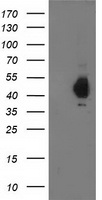PDHA1 Mouse Monoclonal Antibody [Clone ID: OTI2B10]
CAT#: TA502704
PDHA1 mouse monoclonal antibody, clone OTI2B10 (formerly 2B10)
Size: 30 ul
Formulation: Carrier Free
Specifications
| Product Data | |
| Clone Name | OTI2B10 |
| Applications | FC, IF, WB |
| Recommended Dilution | WB 1:2000, IF 1:100, FLOW 1:100 |
| Reactivities | Human, Mouse, Rat |
| Host | Mouse |
| Isotype | IgG2b |
| Clonality | Monoclonal |
| Immunogen | Full length human recombinant protein of human PDHA1 (NP_000275) produced in HEK293T cell. |
| Formulation | PBS (PH 7.3) containing 1% BSA, 50% glycerol and 0.02% sodium azide. |
| Concentration | 1 mg/ml |
| Purification | Purified from mouse ascites fluids or tissue culture supernatant by affinity chromatography (protein A/G) |
| Conjugation | Unconjugated |
| Storage | Store at -20°C as received. |
| Stability | Stable for 12 months from date of receipt. |
| Predicted Protein Size | 40.2 kDa |
| Gene Name | pyruvate dehydrogenase E1 subunit alpha 1 |
| Database Link | |
| Background | The pyruvate dehydrogenase (PDH) complex is a nuclear-encoded mitochondrial multienzyme complex that catalyzes the overall conversion of pyruvate to acetyl-CoA and CO(2), and provides the primary link between glycolysis and the tricarboxylic acid (TCA) cycle. The PDH complex is composed of multiple copies of three enzymatic components: pyruvate dehydrogenase (E1), dihydrolipoamide acetyltransferase (E2) and lipoamide dehydrogenase (E3). The E1 enzyme is a heterotetramer of two alpha and two beta subunits. This gene encodes the E1 alpha 1 subunit containing the E1 active site, and plays a key role in the function of the PDH complex. Mutations in this gene are associated with pyruvate dehydrogenase E1-alpha deficiency and X-linked Leigh syndrome. Alternatively spliced transcript variants encoding different isoforms have been found for this gene. |
| Synonyms | PDHA; PDHAD; PDHCE1A; PHE1A |
| Reference Data | |
| Protein Families | Druggable Genome |
| Protein Pathways | Butanoate metabolism, Citrate cycle (TCA cycle), Glycolysis / Gluconeogenesis, Metabolic pathways, Pyruvate metabolism, Valine, leucine and isoleucine biosynthesis |
Documents
| Product Manuals |
| FAQs |
| SDS |
Resources
| Antibody Resources |
{0} Product Review(s)
Be the first one to submit a review






























































































































































































































































 Germany
Germany
 Japan
Japan
 United Kingdom
United Kingdom
 China
China







